

The Mathematics of Magic: The Gathering. The Mathematics of Magic: The Gathering. Magic: The Gathering is a game which some take seriously, and others lightly.
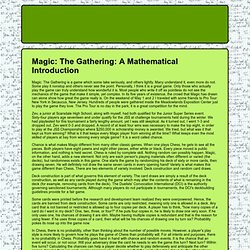
Many understand it, even more do not. Some play it nonstop and others never see the point. Personally, I think it is a great game. Only those who actually play the game can truly understand how wonderful it is. Most people who write it off as pointless do not see the mechanics of the game that make it simple, yet complex. Zev, a junior at Scarsdale High School, along with myself, had both qualified for the Junior Super Series event.
Chance is what makes Magic different from many other classic games. Deck construction is part of what governs this element of variety. Some cards were printed before the research and development team realized they were overpowered. In Chess, there is no probability, other than thinking about the number of possible moves. The Mathematics of Magic: The Gathering. The object of Magic is simple.
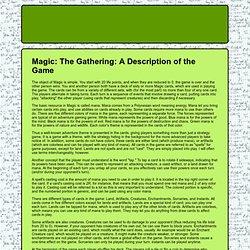
You start with 20 life points, and when they are reduced to 0, the game is over and the other person wins. The Mathematics of Magic: The Gathering. Perhaps, at this point, one who is unfamiliar with the game still may be confused.
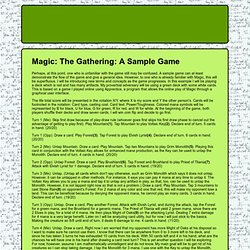
A sample game can at least demonstrate the flow of the game and give a general idea. However, to one who is already familiar with Magic, this will be superfluous. I will be introducing new terms and concepts as the game progresses. In this example I will be playing a deck which is red and has many artifacts. My proverbial adversary will be using a green deck with some white cards. The life total score will be presented in the notation X/Y, where X is my score and Y the other person's. Turn 1 (Me): Skip first draw because of play-draw rule (whoever goes first skips his first draw phase to cancel out the advantage of getting to play first). Turn 1 (Opp): Draw a card. Turn 2 (Me): Untap Mountain. Turn 2 (Opp): Untap Forest. Turn 3 (Me): Untap.
Turn 3 (Opp): Untap. Turn 4 (Me): Untap. Doing the math, I now have 5 mana remaining, 3 of which are red. Footnotes: The Mathematics of Magic: The Gathering. How much of a role in the game does experience make?
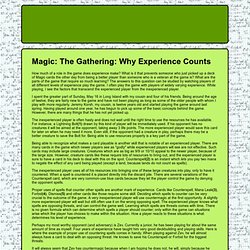
What is it that prevents someone who just picked up a deck of Magic cards the other day from being a better player than someone who is a veteran at the game is? What are the parts of the game that require so much learning? The Mathematics of Magic: The Gathering. Game theory is a branch of mathematics which has been explored fairly recently within the century.
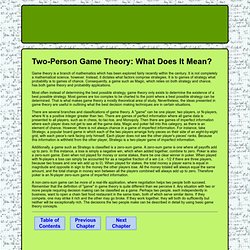
It is not completely a mathematical science, however. Instead, it dictates what factors comprise strategies. It is to games of strategy what probability is to games of chance. Consequently, a game such as Magic, which relies on both strategy and chance, has both game theory and probability applications. Most often instead of determining the best possible strategy, game theory only exists to determine the existence of a best possible strategy. There are several branches and classifications of game theory. Additionally, a game such as Stratego is classified is a zero-sum game. A non-zero-sum game can be more of a real-life application, where negotiation helps two people both succeed. The Mathematics of Magic: The Gathering. Game theory is about choices.
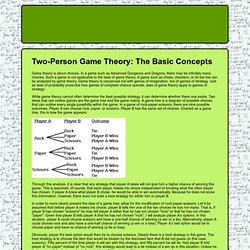
In a game such as Advanced Dungeons and Dragons, there may be infinitely many choices. Such a game is not applicable to the laws of game theory. A game such as chess, checkers, or tic-tac-toe can be analyzed by game theory. The Mathematics of Magic: The Gathering. Now that the ideas of perfect and imperfect information, zero-sum and non-zero-sum games, game trees and matrices are all clear, I can begin to correlate these ideas with their presence in the game of Magic: The Gathering.
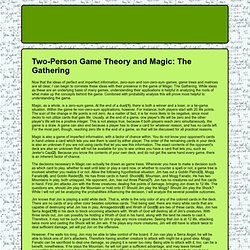
While ideas as these are an underlying basis of many games, understanding their applications is helpful in analyzing the roots of what make up the concepts behind the game. Combined with probability analysis this will prove most helpful to understanding the game. Magic, as a whole, is a zero-sum game. The Mathematics of Magic: The Gathering. Decision-making is a vital aspect of Magic; however, it is not the sole discerning backbone of the game.
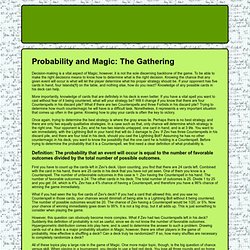
To be able to make the right decisions means to know how to determine what is the right decision. Knowing the chance that any given event will occur is what will let the player determine what his proper strategy should be. If your opponent has five cards in hand, four Islands(1) on the table, and nothing else, how do you react?
Knowledge of any possible cards in his deck can help. More importantly, knowledge of cards that are definitely in his deck is even better. The Mathematics of Magic: The Gathering. Since Magic is supposed to be played with a randomized deck of sixty or more cards, the issue of shuffling presents itself at the beginning of the game, as well as some situations within the game that require shuffling.
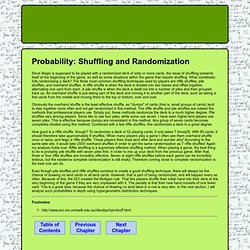
What constitutes fully randomizing a deck? The three most common shuffling techniques used by players are riffle shuffles, pile shuffles, and overhand shuffles. A riffle shuffle is when the deck is divided into two halves and riffled together, alternating one card from each. A pile shuffle is when the deck is dealt out into a number of piles and then grouped back up. An overhand shuffle is just taking part of the deck and moving it to another part of the deck, such as taking a few cards from the middle and moving them to the top or bottom, over and over. Obviously the overhand shuffle is the least effective shuffle, as "clumps" of cards (that is, small groups of cards) tend to stay together more often and not get randomized in this method. Footnotes: The Mathematics of Magic: The Gathering. Now the question arises again: If you have four of a card in your sixty-card deck, what is the chance you will draw one in your opening hand?
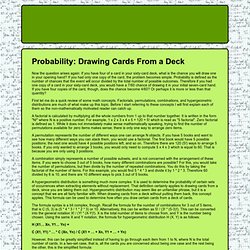
The Mathematics of Magic: The Gathering. In a game of Magic, there is a lot of decision making and probability. I have already given a glimpse of the decision-making aspect. Now I shall examine the probability aspect. Several random events happen in Magic. The Mathematics of Magic: The Gathering. In Magic: The Gathering, there are two major factors which contribute to a victory. The deck and the player are these two factors. One player may play a deck to complete perfection, while another may lose horribly with it every game. Sometimes it may be the player's strategies that are flawed, and sometimes it may be the decks that he has to play against. Certain decks, as I will show, have inherent strengths against others, and that gives them a higher overall win percentage. Given that two players of equal skill are using the two given decks, the deck with an inherent strength against the other deck will win more often.
The Mathematics of Magic: The Gathering. Magic is a very intriguing game in the aspect that there are so many possible deck configurations. Within the infinite possibilities of deck construction lie several effective deck archetypes. A deck archetype simply represents a deck type and all its minor variations. A green deck with many small creatures, commonly referred to as a green horde deck, can have several different configurations.
This means some may use one card over another, or maybe just use a different number of some cards. The Mathematics of Magic: The Gathering. While it is impossible to classify every deck into a concrete category, the vast majority of tournament-level decks fall into one of three categories. There are control decks, aggressive decks, and combo decks. While it is not a definite rock-paper-scissors scenario, aggressive decks tend to beat control decks more often than not. However, it really depends on which kinds of decks they are. Control decks can often win against combo decks but only if there is a lot of countermagic in the control deck. Combo decks can often win against aggressive decks simply because they can ignore the pressure and win immediately at a certain point.
The Mathematics of Magic: The Gathering. A good deck needs to be able to not only have a good chance of winning overall, but it also needs to have a good chance of winning against the most popular decks. If "Draw-Go" (a popular blue control deck) is the dominant deck, playing a combination deck such as Prosperous Bloom is usually a bad idea. Even if Bloom may win about 75% of the time against all the other decks, it is no good if it cannot beat the most popular deck consistently. Of course, no one deck is usually ever dominant. To date, only twice was there a deck that truly dominated the tournament scene. In November-December of 1998, after the release of the Urza's Saga standalone expansion, a completely overpowered combo deck based around a card called Tolarian Academy(1) emerged.
The first obvious step is to know how to play your deck as effective as possible. For this purpose, I played my red control deck many games in order to demonstrate whether playing it in a tournament would be a good idea. The Mathematics of Magic: The Gathering. The Mathematics of Magic: The Gathering. The final question arises: How do all these concepts come together as a whole? The Mathematics of Magic: The Gathering. The Mathematics of Magic: The Gathering. I will now attempt to answer my own questions after doing my research and analysis. My name is Jon Prywes, and I am 17. I have been playing Magic for four and a half years. I have taken everything up to BC Calculus and will be taking Linear Algebra in the fall. I see math as a very important part of Magic.
Knowing how to create an efficient deck and play it well requires a basic understanding of probability and statistics. I will base my strategy often upon what I anticipate my opponent doing.